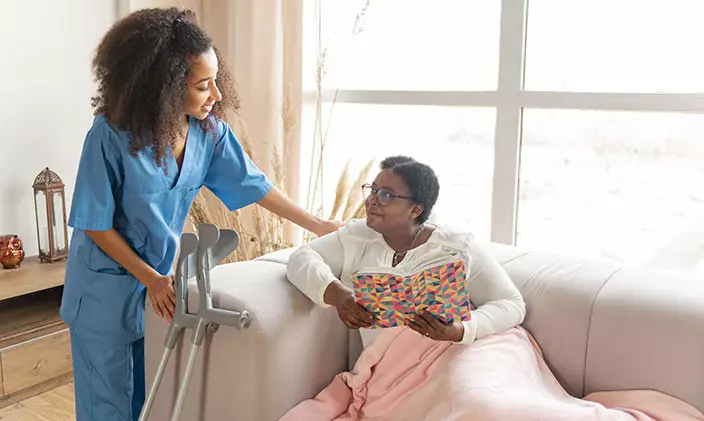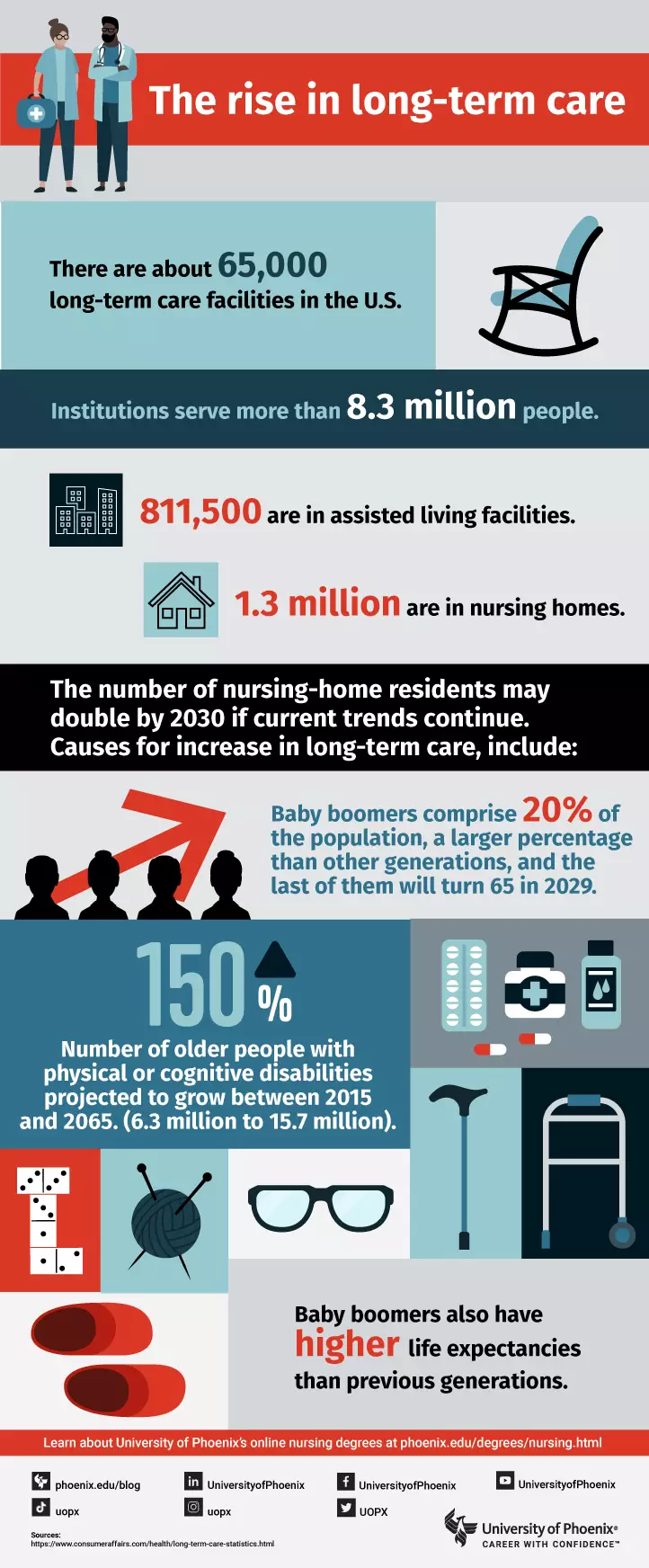UOPX Alumna Kim Beckman's Calling to Home Healthcare

Written by Elizabeth Exline

Reviewed by Mark Jóhannsson, DHSc, MPH, Dean, College of Health Professions

At a glance
- Home healthcare refers to rehabilitation services such as skilled nursing, physical therapy and occupational therapy, which are performed in a patient’s place of residence.
- Demand for home healthcare is on the rise because of an aging population and improved technology.
- Home health aides, licensed vocational nurses and registered nurses work on interprofessional teams to support rehabilitation in the homes of individuals.
- Explore RN to Bachelor of Science in Nursing degree programs
Some jobs are just that: roles people take on out of interest, aptitude or need. Others are more of a calling, something you feel compelled to do, even when it’s hard.
For Kim Beckman, home healthcare falls into the latter category. “It’s an amazing experience getting to know your patients and their families, because you are in there day in and day out for maybe a month or more. You really get to know them,” she says.

Beckman is the executive director of Nurse On Call , a home care organization affiliated with LHC Group. She started her career, however, working in hospice and home healthcare, and there’s a lot about the role of a home care provider that still speaks to her. The flexible schedule, the autonomy, and the patients and their families are just some of the perks.
What does it take to be a successful caregiver? What does the job entail? Here, we explore the growing and dynamic field of home healthcare.
What is home healthcare?
Home healthcare is an umbrella term that includes skilled nursing, physical and occupational therapy, speech-language therapy and medical social services. Such home care services are extended to individuals in their homes or in assisted living facilities by a variety of practitioners, including therapists, social workers, registered nurses, licensed vocational nurses and nurse aides.
Physicians, nurses and therapists collaborate to create and follow a plan of care for each patient. The plan is documented and carefully adhered to in order for home healthcare agencies to comply with Medicare and state regulations.
The patients, meanwhile, can be individuals who require home care services while they recover from a short-term illness or injury or learn how to live with a disability. Usually, however, home care is the domain of an older patient population, some of whom cope with chronic illness. In cases of long-term home care, the goal often centers on maintaining the highest quality of life and independence as possible.
“We definitely get a younger demographic from time to time,” Beckman notes, “but the elderly form the majority of our patient population.”
Why home healthcare is on the rise
As the nation’s population ages, the demand for home healthcare is increasing. According to the Centers for Medicare & Medicaid Services , reasons for choosing home care services include:
1. Improved technology: Some healthcare services that were once performed in hospitals can now be provided at home.
2. Cost benefit: Home care is usually less expensive but as effective as care provided in a hospital.
3. Comfort: Patients and their families may prefer to be cared for at home, where they are comfortable, rather than at a hospital.
What does a home health nurse do?
Caregivers shoulder a variety of responsibilities, and they have to do so in sometimes unusual environments.
“We care for our patients in assisted living facilities and their own homes,” Beckman explains. “We have to meet people where they’re at.”
That extends to the emotional as well as the physical. Home care services treat people of all ages, backgrounds and temperaments, often when they’re feeling their most vulnerable.
In addition to providing quality healthcare, health professionals have to intuit the level of emotional connection their patients require. Teaching caregivers, family members and social support systems how to provide the rehabilitative care needed in the home setting is a big part of home healthcare.
“You have to be a chameleon,” Beckman observes. “You come in and you become what they need at that point.”
Sensitivity can’t necessarily be trained. A host of other necessary skills, however, can. Home health aides or registered nurses may do the following while working in home care:
- Develop a healthcare plan with a physician
- Provide wound and catheter care
- Provide ostomy care
- Flush and maintain IVs and PICC lines
- Administer medication
- Monitor recovery
Other staff, such as licensed vocational nurses and home health aides, often carry out tasks related to the plan of care, depending on their qualifications.
Home health nurses and their team have to do all of this in sometimes tricky settings. One of the biggest challenges facing caregivers, Beckman notes, is implementing a sterile technique in an unsterile home environment.
Being in someone’s living space offers opportunities too. Teaching caregivers, family members and social support systems how to provide the rehabilitative care needed in the home setting is a big part of home health. Nurses can see firsthand how patients live and what other medications or supplements they may be taking. Even something as pedestrian as ibuprofen can have adverse interactions with certain prescription medications.
“I want to see everything,” Beckman explains. “I want to get a real picture of what’s happening so I can build the best plan of care.”
Of course, even the best-laid plans can go awry. One of the most important skills for a home care provider may just be the ability to think critically on one’s feet.
“One time I opened the patient’s wound, and maggots came out,” Beckman recalls. Even for situations that aren’t that extreme, nurses frequently come across unpleasant or potentially dangerous complications. Yes, they can call for help, but they need to know how to triage the situation — and fast.
“Critical thinking is a must, and critical thinking comes with experience,” Beckman says.
How can you become a home health nurse?
Several paths exist to working in home care, including working as a home health aide or as a registered nurse and licensed practical/vocational nurse who provides home care. Home health aides typically need a high school diploma or its equivalent, and some agencies may require additional training or testing.
Licensed practical/vocational nurses have generally completed a state-approved program in about one year and then obtained their license before working.
A registered nurse must have completed an approved nursing program such as an Associate Degree in Nursing (ADN), an Associate of Science in Nursing (ASN) or a Bachelor of Science in Nursing (BSN). From there, they have to pass the National Council Licensure Examination (NCLEX) and obtain their state license.
Beckman started out with an Associate Degree in Nursing before completing the RN to Bachelor of Science in Nursing program at University of Phoenix in 2021. “I got a lot out of it as far as learning how to be a better leader in my role,” Beckman says, reflecting on how she uses her BSN degree in her current role as a director.
Salary and job outlook for home care professions
As Beckman points out, working in home healthcare has advantages. For one, your schedule is fairly flexible, which means you can accommodate other obligations (school pick-ups, dentist appointments) with relative ease.
Another perk? “You’re not stuck in a building for eight hours a day,” Beckman says. “I always said it was an office with a view when I was driving all over God’s country in northern Arizona to see patients.”
While the U.S. Bureau of Labor Statistics (BLS) doesn’t provide salary and job outlook data for home health nurses specifically, the following information is available.
Salary ranges are not specific to students or graduates of University of Phoenix. Actual outcomes vary based on multiple factors, including prior work experience, geographic location and other factors specific to the individual. University of Phoenix does not guarantee employment, salary level or career advancement. BLS data is geographically based. Information for a specific state/city can be researched on the BLS website.
BLS Occupational Employment Projections, 2022-2032 is published by the U.S. Bureau of Labor Statistics. This data reflects BLS’ projections of national (not local) conditions. These data points are not specific to University of Phoenix students or graduates.
Home health aide
National average salary: As of May 2023, home health and personal care aides earned between $23,910 and $42,450 , with a median wage of $33,530, according to the U.S. Bureau of Labor Statistics (BLS).
Job outlook: Employment is projected to grow 22% from 2022 to 2032, according to BLS .
Registered nurse
National average salary: As of May 2023, registered nurses earned between $63,720 and $132,680 , with a median wage of $86,070, according to BLS.
Job outlook: Employment is projected to grow 6% from 2022 to 2032, according to BLS .
Licensed vocational nurse
National average salary: As of May 2023, licensed vocational nurses earned between $45,670 and $77,870 , with a median wage of $59,730, according to BLS.
Job outlook: Employment is projected to grow 9% between 2020 and 2030, according to BLS.
Of course, perhaps the biggest advantage to working in home care is the fulfillment it brings. You can make a lasting impact in the lives of patients and their families, all while boosting your professional experience.
“People will come to home care because they want to expand their skill set,” Beckman observes. “We get to do so many things in the home.”

ABOUT THE AUTHOR
Elizabeth Exline has been telling stories ever since she won a writing contest in third grade. She's covered design and architecture, travel, lifestyle content and a host of other topics for national, regional, local and brand publications. Additionally, she's worked in content development for Marriott International and manuscript development for a variety of authors.

ABOUT THE REVIEWER
Mark Jóhannsson is the Dean of the College of Health Professions. He has a career spanning over 35 years of healthcare management, public health practice, higher education administration, teaching and clinical/behavioral research within corporate, community and academic settings. He has served as both an educational and keynote speaker, and he has been published in a variety of peer-reviewed and periodic literature.
This article has been vetted by University of Phoenix's editorial advisory committee.
Read more about our editorial process.
want to read more like this?




